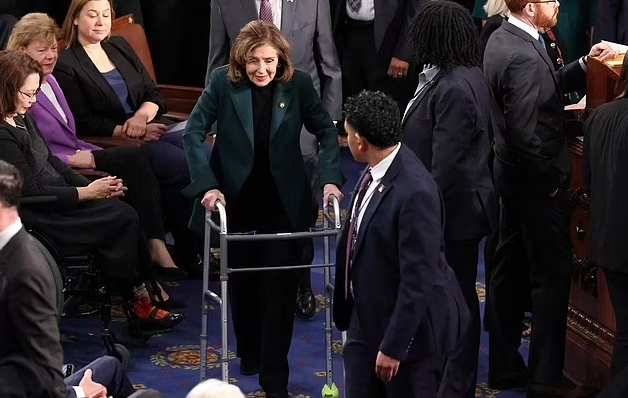Former House Speaker Nancy Pelosi, 84, returned to the House floor on January 6, 2025, relying on a walker after undergoing hip replacement surgery. Her return comes at a pivotal moment in Congress, but it has reignited debate about the physical and mental fitness of aging political leaders.
Details of the Injury and Recovery
Pelosi fractured her hip in December 2024 during an official trip to Luxembourg commemorating the 80th anniversary of the Battle of the Bulge. The fall reportedly occurred while descending stairs in high heels. She underwent hip replacement surgery at Landstuhl Regional Medical Center, a U.S. military hospital in Germany.
While Pelosi’s commitment to her role has been highlighted by her swift return, her reliance on a walker and apparent physical frailty raise concerns about whether she can effectively represent her constituents in the demanding environment of Congress.
Aging in Leadership: A Broader Concern
Pelosi’s return highlights a growing issue in American politics: the advanced age of many lawmakers. Critics argue that prolonged tenures for aging politicians can lead to diminished effectiveness and decision-making, ultimately detracting from governance.
Pelosi, who has served in Congress since 1987, has faced increasing scrutiny over whether long-serving lawmakers should step aside to make way for new leadership. Critics argue that physical limitations, like those now apparent, can impede the ability to fully execute the responsibilities of the office.
WATCH: 84-year-old Nancy Pelosi enters the House Chamber with the help of a walker.
This lust for power is terrifying and sick. pic.twitter.com/E8yTuXWWrf
— johnny maga (@_johnnymaga) January 6, 2025
Public and Political Reaction
While Pelosi’s allies lauded her determination to return, others expressed concerns about her capacity to effectively perform her duties. Some opponents view her return with a walker as symbolic of a broader issue: leaders clinging to power despite clear signs that it may no longer be practical or in the best interest of their constituents.
“Pelosi’s return is admirable, but it also raises legitimate questions about whether leaders of her age should continue holding such critical positions of power,” said one political analyst. “It’s not just about her—it’s about the larger issue of whether Congress needs a generational shift.”
A Changing Political Landscape
Pelosi’s continued presence in Congress underscores the reluctance of many long-serving politicians to relinquish power, despite calls for term limits or other measures to address the entrenched nature of U.S. political leadership. Critics argue that this stifles opportunities for fresh perspectives and more dynamic representation.
Conclusion
While Pelosi’s determination to return to work is commendable, her reliance on a walker and the circumstances of her injury raise serious questions about her ability to effectively serve in a physically and mentally demanding role. As the U.S. grapples with the broader implications of an aging political class, Pelosi’s return serves as a focal point in the ongoing debate about leadership, fitness, and the need for generational renewal in Congress.


